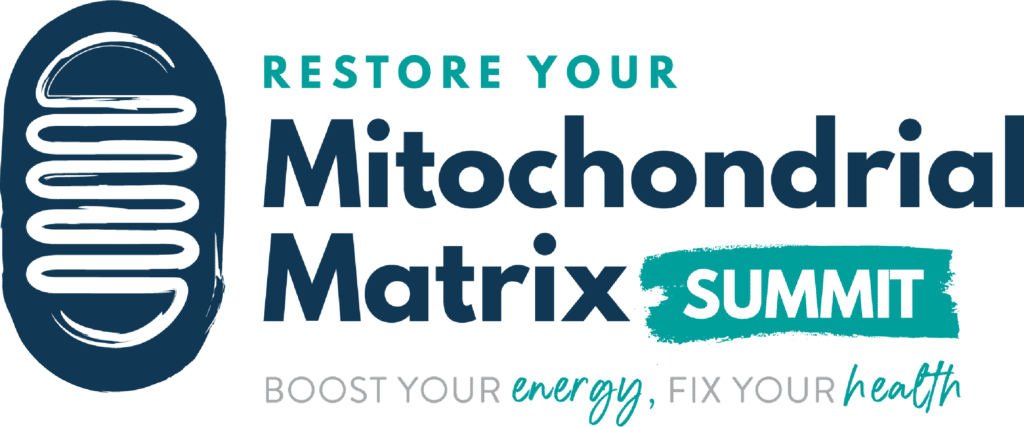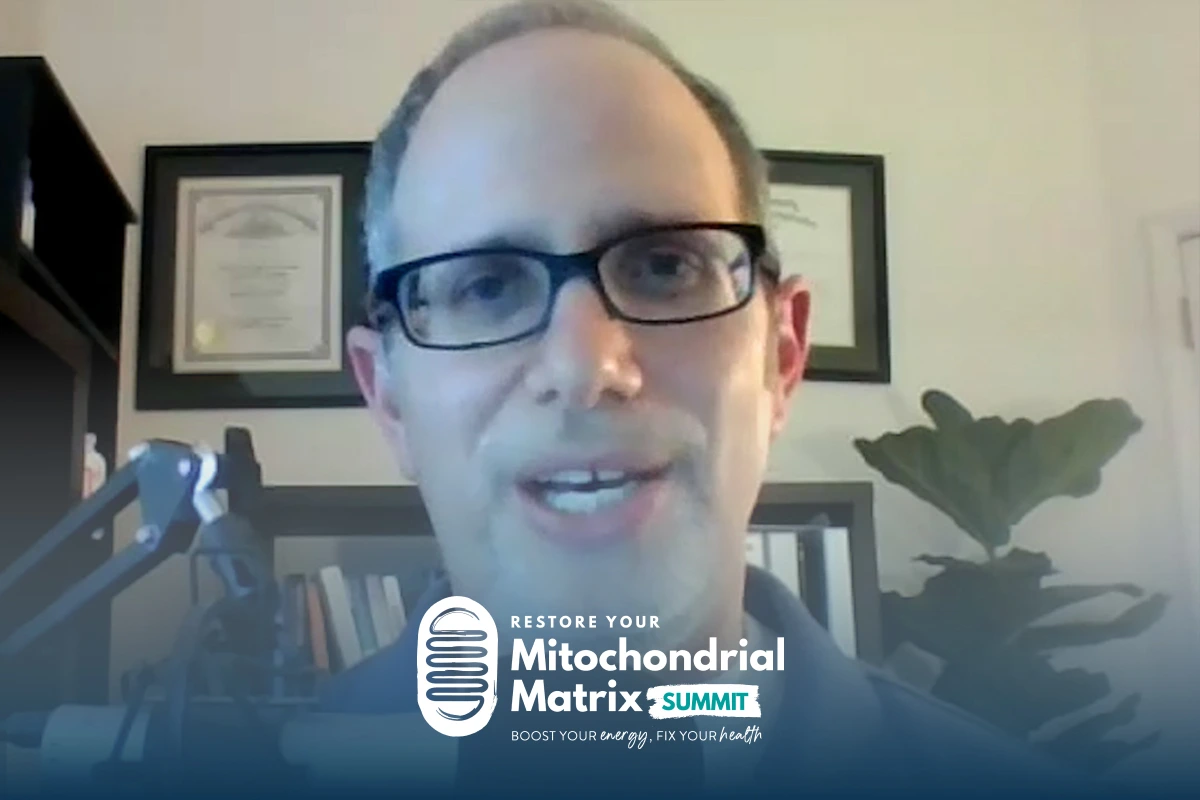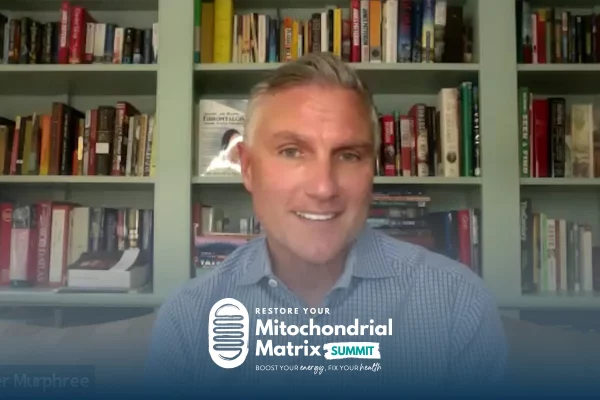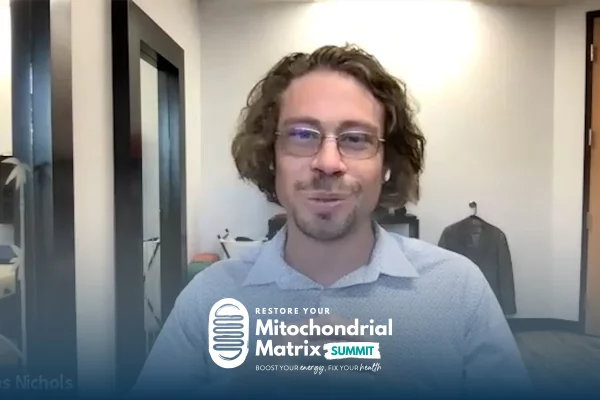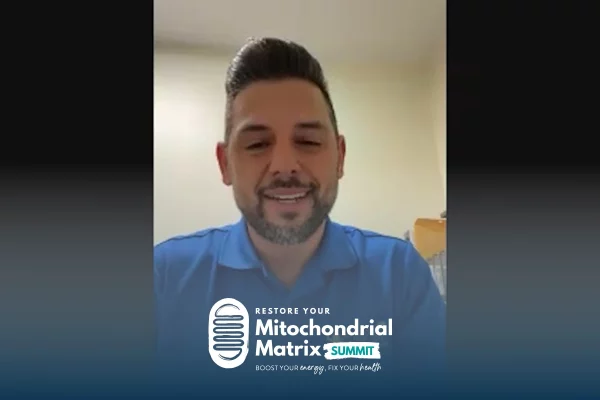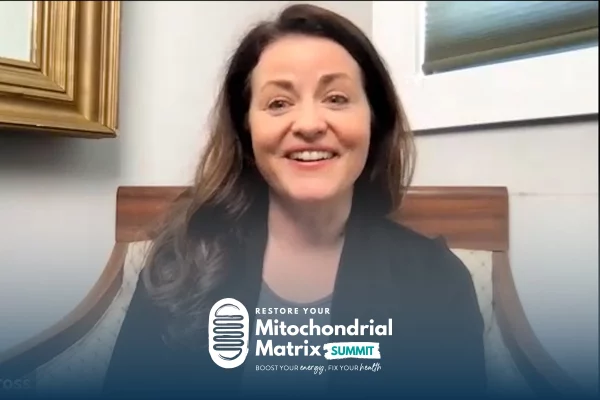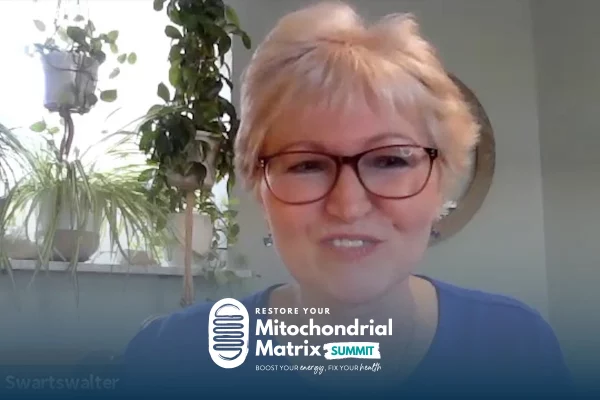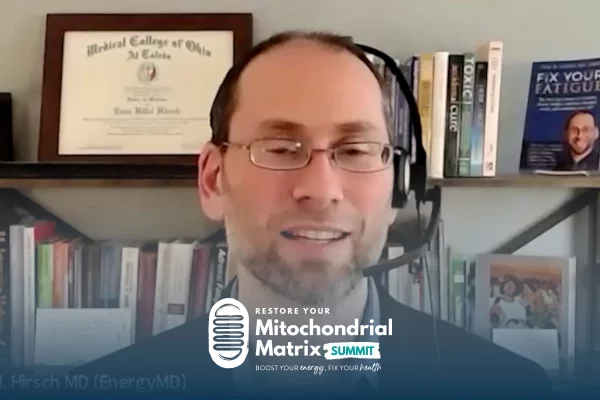Join the discussion below
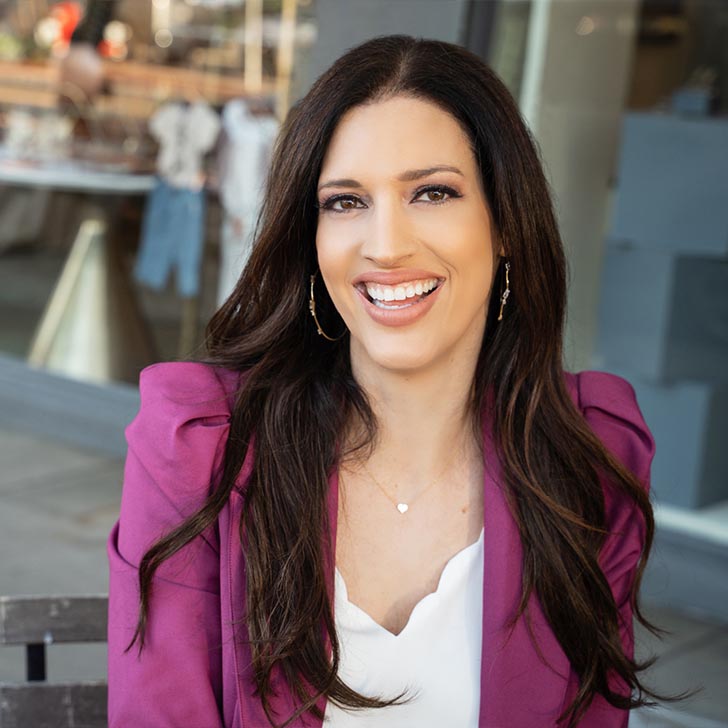
Laura Frontiero, FNP-BC, has served thousands of patients as a Nurse Practitioner over the last 22 years. Her work in the health industry marries both traditional and functional medicine. Laura’s wellness programs help her high-performing clients boost energy, renew mental focus, feel great in their bodies, and be productive again.... Read More

Dr. Eric Osansky is chiropractor, clinical nutritionist, and a certified functional medicine practitioner who helps people recover from thyroid and autoimmune thyroid conditions. You’ve authored a few books: "Natural Treatment Solutions for Hyperthyroidism and Graves' Disease" and "Hashimoto's Triggers". Read More
- Learn why thyroid hormone is important for optimal mitochondrial health, and how hypothyroidism/ Hashimoto’s and hyperthyroidism/ Graves’ disease can impact your mitochondria.
Laura Frontiero, FNP-BC
Welcome back, you’re watching “The Restore Your Mitochondrial Matrix Summit.” I’m your host, Laura Frontiero. I’m bringing you experts with fresh ideas and proven methods to help you boost your energy and fix your health so you can build the life you love. And today my special guest is Dr. Eric Osansky. Hi, Eric, welcome to the summit.
Dr. Eric Osansky
Hey, Laura, appreciate you having me, and I’m excited to talk about mitochondria and thyroid.
Laura Frontiero, FNP-BC
Me too, I love it that this is your topic. And I wanna introduce you to people and hear a little bit about your story. So you’re a chiropractor, you’re a clinical nutritionist, you’re a certified functional medicine practitioner and you help people recover from thyroid and autoimmune thyroid conditions. You’ve authored a couple of books, “Natural Treatment Solutions for Hyperthyroidism” and “ Graves Disease and Hashimoto’s Triggers.” So, welcome, welcome. I would love to know as we get into this, why do you focus on thyroid? What’s your story? Why is this your thing?
Dr. Eric Osansky
Sure, well, I dealt with Graves disease and before dealing with grave disease, I developed hyperthyroidism. And I guess to tell my story just shortly, I was walking around in a Sam’s club and decided to take my, you know how they have those automated blood pressure machines and I took my blood pressure and my blood pressure was fine, but my heart rate was elevated. And so I, you know, that was unusual, so I took my heart rate the next few days and continued to be elevated. And also I was losing weight and other signs, but I was also detoxifying and, you know, dieting, so I attributed the weight loss to that, but O to put in the pieces together, I was thinking maybe hyperthyroidism, but I wasn’t sure. And so I went to a doctor, primary care doctor, he ran some tests and sure enough had hyperthyroidism.
And shortly after that went to an endocrinologist and she gave me the diagnosis of Graves disease. And I decided to take a natural approach what my background, even though I didn’t have experience working with thyroid patients at the time, and, you know, really didn’t know much about Graves disease to be honest, but even though when I was practicing chiropractic at the time, when I took my CE credits, my continuing education credits, I would still always take nutrition courses, nutrition classes, and I took a few functional endocrinology courses. So I knew there was hope to reverse hyperthyroidism as well as other types of thyroid conditions. So, again, long story short, I took a natural approach, changed my diet, focused on stress management and took some supplements and reversed my condition, regained my health, and just decided to help other people with thyroid and autoimmune thyroid conditions.
Laura Frontiero, FNP-BC
Wow, so you really took a personal experience and just decided, I’m gonna be an expert in this and I’m gonna help people with it and write some books and become a thyroid guy. Wow, that’s incredible, impressive.
Dr. Eric Osansky
Yeah, I mean, pretty much. I mean, as you know, there’s so many people out there with thyroid conditions and, you know, especially when it comes to hyperthyroidism, there’s not a lot of practitioners that focus on hyperthyroidism, so I did see it as an opportunity and especially with my experience. So yeah, that’s very exciting and yeah, I’ve been doing this now for well over 10 years.
Laura Frontiero, FNP-BC
Wow, well, we’re gonna get into the connection with mitochondria, so can you explain how, so there’s hypothyroidism, Hashimoto’s low thyroid and then we’ve got hyperthyroidism Graves disease. And can you explain how both of these impact your mitochondria health?
Dr. Eric Osansky
Sure, do you want me to start by just talking a little bit about thyroid hormone and how thyroid hormone impacts the mitochondria?
Laura Frontiero, FNP-BC
Start with whatever makes sense to you and will help our viewers understand this and know that we’ve got clinicians watching and we also have consumers, health consumers watching, so start where you think makes the most sense.
Dr. Eric Osansky
Sure, well, it’s important to understand that thyroid hormone affects pretty much everything in the body, every organ system, every cell, the heart, the gut, the liver, you know, affects fertility, ovulation, the brain, and you know what pretty much thyroid hormones act directly on the mitochondria. So one way they affect mitochondria, they stimulate energy production within the mitochondria, which of course is important. And then I’m sure some of the other speakers have mentioned mitochondria genesis, which is the formation of mitochondria and thyroid hormones actually stimulate mitochondrial genesis.
So, you know, if you don’t have enough thyroid hormone, then you’re not gonna have enough mitochondria and you’re gonna have depleted levels of ATP, which of course isn’t a good thing. And then from a hyperthyroid perspective, so again, two little thyroid hormones isn’t a good thing. But if you have with hyperthyroidism again, everything’s revved up increased metabolism. And so you’re using up all this ATP, so if you have too much thyroid hormone, this also can cause depleted levels of ATP in a different way, just because again, everything is sped up with hyperthyroidism. So either way, it’s a no win situation, if it’s too low or if the thyroid hormone levels are too low or too high, that could pretty much cost depleted levels of ATP.
Laura Frontiero, FNP-BC
So hypothyroidism, depleted ATP, can’t make new baby mitochondria, can’t grow new ones and hyperthyroidism you’re running through your energy, and I’m assuming you’re burning out your mitochondria too, because they just can’t keep up.
Dr. Eric Osansky
Pretty much, and also with the hyperthyroidism, the research shows that you have increased oxidative injury, which is therefore you have an increased risk of having mitochondrial dysfunction, mitochondria damage, but exactly, exactly what you said.
Laura Frontiero, FNP-BC
All right, so now we’ve set the stage, we’ve set the baseline thyroid and mitochondria super connected, super important, so let’s go from here, where do you wanna go?
Dr. Eric Osansky
Well, I assume some of the other speakers have spoke about oxidative stress and, you know, most cases of thyroid conditions are autoimmune, so when we talk about hypothyroidism, most cases of hypothyroidism are Hashimoto’s and most cases of hyperthyroidism are Graves. And, you know, so what these autoimmune conditions, you have oxidative stress, which, you know, I’m sure others have mentioned that there’s either an excess of free radicals or a decrease of antioxidants, and so this is not good when it comes to mitochondria, but also sets the stage when it comes to autoimmune conditions, the development of autoimmune conditions, Graves, Hashimoto’s as well as multiple sclerosis, rheumatoid arthritis.
So you of course want to do everything from a mitochondrial standpoint to reduce oxidative stress, but it’s similar when it comes to autoimmune conditions. So the question is what’s causing the oxidative stress and what’s, you know, what’s causing the autoimmunity ’cause they kind of go hand in hand, so really I guess the next direction is maybe talking about some of the common causes, some of the common triggers of thyroid autoimmunity, both Graves and Hashimoto’s.
Laura Frontiero, FNP-BC
Yep, let’s do it. Let’s go there because I know you are an absolute expert in this, so why is this happening to people?
Dr. Eric Osansky
All right, sure. So there’s a number of different reasons. One of course we live in a toxic world and you know, all these environmental chemicals cost a lot of oxidative stress, heavy metals, such as mercury, cadmium, arsenic, and there’s infections, viruses, including Epstein barrs, cytomegalovirus, the recent virus we’ve been dealing with over the last few years. You know, stress is also a trigger. You know, I guess I should backtrack. When talk about autoimmunity, there’s four categories of triggers I discuss. And so I mentioned chemicals, so those are, you know, that’s one category, infections would be a second category, and again, viruses could be Lyme disease. In 2018, I was diagnosed with chronic Lyme, so 2008, it was grave 10 years later, chronic Lyme disease.
So both of those can cause oxidative stress and then stress itself can cause oxidative stress, stress can cause a depletion of nutrients, which is one factor in development of oxidative stress also can cause dysregulation of the immune system and then food, you know, food is another category of trigger. And you know, again, if you’re eating unhealthy foods, you know, that potentially cause oxidative stress. But again, you’re also dealing with nutrients efficiencies if you’re not eating healthy which could play a role in not having optimal mitochondrial health. So, you know, so again, you want to try to find and remove those triggers with really any autoimmune condition. Of course the focus here is on Graves and Hashimoto’s, but really again, it doesn’t make a difference what autoimmune condition you wanna try to find or remove triggers.
Laura Frontiero, FNP-BC
Okay, great. So we got our four categories, now, can you talk a little bit about, I know I wanna switch gears just a tiny bit and I wanna talk about medications.
Dr. Eric Osansky
Sure.
Laura Frontiero, FNP-BC
And thyroid meds, ’cause you know there’s that kind of the Western way of handling thyroid and more the functional medicine way of handling thyroid, so what do thyroid meds do to mitochondrial health? What’s your preferred method of supporting thyroid health?
Dr. Eric Osansky
Sure, so from a hypothyroid standpoint, there’s no evidence I’m aware of that thyroid hormone replacement causes any problems with mitochondria. If anything, it’s the opposite, we mentioned the importance of thyroid hormones. So, I just wanna bring that up before talking about the medications that could potentially be harmful to the mitochondria. A lot of people are taking thyroid hormones, so I don’t want people to get concerned whether they’re taking levothyroxine or if they’re taking desiccated thyroid such as Nature-Throid or Armour, so again, those are perfectly fine. And if anything, if someone’s deficient in thyroid hormone, it may be important to take thyroid hormones for the reasons we mentioned earlier. So when it comes to the medications for hyperthyroidism, that’s where you can run into trouble because according to the research, antithyroid medication is commonly given to people with hyperthyroidism, methimazole the most common at least in United States, carbimazole converts into methimazole and used in some other countries.
And then there’s PTU, which isn’t as common, but sometimes is given and when people take the medication, something I commonly see in my practice when doing a conference and metabolic panel is we see the levels of liver enzymes increase. So elevated liver enzymes, and so according to research, it shows that the medication, what it’s actually doing, or at least one of the things it’s doing, it has unfortunately a lot of, has a lot of other negative side effects. But one thing it’s doing is, or potentially can do is damage the mitochondria in the hepatocytes and the hepatocytes are the liver cells. And it doesn’t mean that everything comes down to risk versus benefits. So I’m not suggesting that there’s not a time and place for antithyroid medication, but especially if you’re having elevated liver enzymes, that’s something to keep in mind. That means it’s not only damaging the cells of liver, but the mitochondria within the cells.
So that’s one thing I wanted to bring up. And I could talk about my preferred method of treatment for hyperthyroidism, but I also wanted to bring up beta blockers. I’m not sure if anybody else in the summit brought up beta blockers, but certain beta blockers can decrease CoQ10, Coenzyme Q10, which I’m sure others have brought up. It’s a powerful antioxidant. It plays a role in reducing oxidative stress and also activated mitochondria. So if you are taking beta blockers, something like propranolol, which is commonly given to people with hyperthyroidism and so that you, I mean, it’ll help with the symptoms that also likely to decrease levels of CoQ10.
So there’s a few different things people could do. So like I said, everything comes down to risk versus benefits. If someone absolutely needs to take, let’s say a beta blocker, then they probably want to take CoQ10, supplement CoQ10, if they absolutely need to take antiar medication, they at the very least want to monitor the liver enzymes and make sure those liver enzymes aren’t getting elevated. And usually the endocrinologist who is prescribing the antiar medication, usually they will keep track of this, sometimes they don’t. And if the liver enzymes are elevated, it oftentimes they’ll tell the person to stop taking antithyroid medication. But if for any reason the person continues to take antithyroid medication, you know, they could take things to help protect the liver such as milk thistle, or do things to increase glutathione which is the master antioxidant in the body, or, you know, by taking NAC and acetylcysteine or liposomal glutathione.
But then, so when I dealt with Graves disease, I chose not to take antithyroid medication and to be upfront at that time, this was again, 2008, when I was diagnosed, I had no idea that it would affect the mitochondria, the mitochondria within liver cells. I just knew that from what I read, that, you know, it does put a lot of stress on the body and, you know, side effects are common. And so I chose to take an herbal approach, and what I took was an herbal bugleweed, which is an herb what antithyroid properties and it worked really well for myself. And it works for a lot of my patients, I can’t say it works 100% of the time. And that’s where sometimes we have to weigh the risk versus benefits when it comes to, you know, taking antithyroid medication. And one more thing I’ll say with beta blockers, again, if someone needs to take a beta blocker, take CoQ10, but I also took in addition to bugleweed, I took something called motherwort and motherwort is also an herb.
And so I think of it as natural beta blocker and you know, so that’s another option. So I took bugleweed and motherwort what some people would hyperthyroidism will take antithyroid medication such as methinizole and a beta blocker. So there are alternatives, and I’m not suggesting if anybody’s taking the medication, I’m not saying stop taking the antiar medication and or the beta blocker and take the bugleweed, and the motherwort, what I would say is work with the healthcare practitioner. If you’re thinking about doing that, ’cause you definitely, you know, it really with any condition, you don’t wanna stop abruptly taking your medication, but especially with hyperthyroidism, because you could go into a thyroid storm, you could, you know, develop an arrhythmia, so definitely wanna be cautious.
Laura Frontiero, FNP-BC
Yes, definitely our goal here is to tell you about options that are available to have you start thinking about maybe having a second opinion or a consult with another practitioner like Eric, and we’ll make sure you know how to get a hold of Eric before we end this interview. But yeah, definitely, I echo that if you’re watching and thinking you wanna stop your prescriptions, don’t do that right now. Don’t do that without support with a practitioner, yeah. Yeah, so thank you, Eric. Anything else you wanna say on medications for thyroid and medication alternatives for thyroid before we shift into talking about another topic?
Dr. Eric Osansky
No, a as I mentioned, so again with thyroid hormone, for those with Hashimoto’s hypothyroid who need thyroid hormone, you know, that’s safe which is good because there’s really no herbal replacement for thyroid hormone which people do ask me frequently, can I stop taking my thyroid hormone and take something else? There are glandulars but they also a lot of the, you pretty much need thyroid hormone if you’re deficient. And then when it comes to again, the medication, like I said, if you it’s risk versus benefits. So just if you need to take the meds, that’s fine. And there’s other things besides bugleweed I should mention L-carnitine taken, which also could support mitochondria too.
L-carnitine in higher doses could actually, there’s some research and I’ve seen it where patients where it has antithyroid properties. So taking and the researcher shows 2,000 to 4,000 milligrams per day of L-carnitine can help with lowering thyroid hormone levels. So that’s an alternative to bugleweed so there’s other alternatives. Again, I think it’s best, you know, as Laura just said, and I said, you know, if you have hyperthyroidism and if you’re taking a medication and you’re not sure, you know, if you’re thinking, well, maybe I would, you know, I would prefer taking the herbs or, you know, L-carnitine or something else, again, work with someone else this way they could go over the different options. And then if you’re gonna make that transition, you could do it in a wise manner and not just stop one and start the other.
Laura Frontiero, FNP-BC
Yeah, thank you. And so I think we covered medications. What I wanna really, I mean, you’ve written entire books about this, so I want you to just dump your brain out here and help our viewers know the steps that you can take to restore the health of your thyroid and your immune system so you can really optimize all your systems, ’cause it’s all connected immune, thyroid, mitochondria, every bit of it. So, what would you take us through in terms of steps to support?
Dr. Eric Osansky
Sure, so, I know we just spoke about medication, but one thing I wanna say the first step for those what, well, I was gonna say what hyperthyroidism, but the thing that you wanna be safe, so before addressing the cause, make sure you do something, be safe. And even with Hashimoto’s if you have really low thyroid hormone levels, you might need to take thyroid hormone replacements. So that’s not addressing the cost, but I did wanna bring that up one more time just to, you know, to be safe. And as far as addressing the course of a problem. So with autoimmunity, you have the tried of autoimmunity, the three-legged stool, I’m sure you’ve heard of that. So, you know, one of the components is a genetic predisposition, which you can’t do anything about, but the good news is again, you could find and remove the triggers, which is the second component. And then there’s that increase in intestinal permeability, which is a medical term for a leaky gut, which is that third component.
So I would say when it comes to triggers, probably the easiest, well, I won’t say easiest thing to do, but probably the first thing I would say is diet because everybody could at least do that on their own. You know, when it comes to, you know, like doing testing, that’s another option, we could talk about that, but everybody should be eating a clean, healthy, anti-inflammatory diet. And there’s different perspectives when it comes to diet. Some will say, I’m sure some during the summit would mention maybe ketogenic and then with autoimmune there’s autoimmune paleo diet. I mean, there’s different diets, but either way, whatever diet, make sure you eat whole healthy foods and avoid the unhealthy oils, refined foods and sugars. So that’s one thing and I would say, after being safe with the, you know, symptom management, that would be, I would say number two to, you know, clean up your diet. And then stress, you know, we just live in a world of constant stressors and it’s definitely not getting any better lately.
And so doing things to improve stress handling, I would say the number one thing, we can’t get rid of the stressors. I mean, sometimes we can, but realistically we’re gonna be dealing with stress on a consistent basis. So the best thing we could do in my opinion is to block out time on a regular basis for stress management. So what I tell my patients is block out, start out with five. If you’re not doing anything currently from a stress management perspective, start with five minutes per day. And the reason I say that is because I’ll get people who are maybe doing yoga for 20, 30 minutes, but they’re only doing it a couple times per week, but I really think you need to do it every day. And I mentioned five minutes just because I want people to get into the routine of stress handling. So everybody, I mean, let’s put it this way. If you can’t find five minutes to block out time for stress, you probably need it more than any other person. So yeah, that’s really the way it works. Those who don’t have the time need it the most.
So, but start with five minutes, pick whatever you would prefer to do. And if you don’t know what you would prefer to do, just start with some deep breathing, but again, you could do meditation, you could do deep breath, you could do yoga, Tai Chi. So five minutes and then once you’re in the routine, then you could gradually increase the duration of sleep, of stress management and speaking of sleep, so that was what I was gonna go to next. So I would say diet, stress management and sleep. Now sleep sometimes it’s a catch 22 because of course there are a lot of people who intentionally neglect their sleep, but there are also people who would love to get quality sleep, but they just can’t get sleep. And sometimes addressing the diet component and the stress management will help greatly with sleep, but sometimes you need to dig deeper. There could be other factors when it comes to sleep.
So that’s where maybe doing some adrenal testing, or again, it could be even a hidden infection. I mean, there’s a lot of issues that could affect sleep and some people EMFs electromagnetic fields. So either way diet, stress management, sleep, and then so tho so these are the basics, you know, then you might need to, in my experience with patients, I do some testing with patients, and one other thing you can do, which maybe would be following sleep is doing and we could argue maybe number one would be reducing toxic load, but even like cleaning up your diet is helping with that. And you know, there are other ways like sauna, you know, I love sauna therapy, sweating out the toxins, but you know, when finding triggers removing triggers, I do like to do some testing. And as far as the types of tests, it does depend on the person, I do like adrenal testing, whether it’s salivary testing or dried urine testing using like the Dutch test.
Some people, I’ll recommend a comprehensive of stool panel and to see if there’s any, not only dysbiosis imbalances in a gut flora, but any pathogens, any parasites, any, you know, pylori. So really, you know, and that’s gets into the infections, the gut infections and you know, so it takes some detective work when it comes to finding the triggers. I mean, in some cases people will eliminate gluten and that’ll be enough but that’s rare. I think that’s just in most cases, a piece of the puzzle. And so finding, removing triggers and then doing things to heal the gut. And when it comes to healing the gut, you know, I’m sure you’re familiar, I know you’re familiar with the five R protocol, and so I won’t get into great detail about that, but unless if you want me to, but I’ll say one thing is to remove the factor that’s causing the leaky gut. One of the most important things, if not the most important thing.
Laura Frontiero, FNP-BC
Let’s get into five R ’cause we have some time and I dropped that word and there’s probably some people watching, going, well, what does five R mean? Yeah, so let’s talk about it.
Dr. Eric Osansky
Okay, okay. Wasn’t sure if you wanted to go deep into that, but yeah, definitely we could do that. So five R protocol, so what relation to gut healing you have the first R is removed, the second is repair, the third is reinoculate. Oh, I’m sorry. The first, wrong order. So first is remove, second is replace, third is reinoculate, fourth is repair, fifth is rebalance. And really, I mean you could do all five at the same time, but arguably the most important factor is that first R removed, the least in my opinion, I mean, they’re all important, but I have a lot of patients who, you know, they’ve searched the internet or they they’re watching summits like this and they’ll hear about, you know, like probiotics and digestive enzymes and they’ll be drinking bone broth and you know, doing all these things for re inoculation and gut healing, you know, gut repair, but they might not be doing things to eliminate the factor that’s causing the increase in intestinal permeability to leaky gut.
Now of course diet does play a big role, so a lot of people do know, okay, I’m gonna eliminate Glutin and maybe I’ll eliminate dairy, but there could be other factors from a diet perspective like corn, and then there could be gut infections, you know? So it’s not all about diet. So, you might need to, I mean, again, start with diet and you might just know that you might need to dig deeper. There’s also glyphosate which we can’t completely get rid of, but that also disrupts the gut microbiome. And so you want to least minimize your exposure to that. And when we talk about replace, that’s replacing components such as digestive enzymes, a lot of people have low stomach acid, so you might have to take betaine HCl or drink some apple side of vinegars to try to stimulate your own body’s production of stomach acid or bitter herbs. Or even fiber falls under that category of remove, and then reinoculate probiotics, prebiotics.
Of course you wanna try to do as much as you can through diet, you know, nothing wrong with taking probiotics. I commonly recommend prebiotics and probiotics as well, but I think you wanna do both if you’re, you know, if you can tolerate fermented foods, then I would recommend things like sauerkraut kimchi, even kombucha. And gut healing, so gut repair is the fourth R and so that’s where again, taking like, or drinking, let’s say bone broth, or if you’re, you know, if you’re a vegetarian, maybe cabbage juice or, you know, taking L-glutamine. And there’s demulcent such as a DGL licorice, slipper L, marshmallow root. And again, it’s not like you need to take all these, but you know, so again, when I dealt with Graves’ disease, honestly there wasn’t the bone broth praise that was here now.
And not that it’s a craze, I mean, it does help, and it’s, you know, nutrient dense does help with gut healing, but back then, I didn’t take bone broth just because it wasn’t brought up to me and I didn’t see it. So, and I was able to heal. So I wouldn’t say it’s absolutely essential to drink bone broth, but again, if you’re willing to drink bone broth, whether you make it yourself or purchase it, if you purchase it organic grass fed preferably. And then the fifth is rebalance, so rebalance things like, again, stress management, vagus nerve, the health of the vagus nerve. So just doing things, you know, like just activate vagus nerve, like hot and cold showers, which I personally do. I can’t say I love the cold showers, but I still still do ’em and vigorous gargling, even coffee EnMS according to some that also will help with the parasympathetic and nervous system. So to summarize those five Rs, if you incorporate the five Rs, you know, those are really the key, you know, that’s the key to healing the gut.
Laura Frontiero, FNP-BC
Yeah, which is so vital to thyroid and it’s vital to mitochondria health as well. It’s vital to support your immune system, and this is why you’re gonna hear, the listeners are gonna hear so many practitioners coming on here talking about the importance of gut health. So I’m glad that we had the opportunity to break that down. Eric, thank you, that was beautiful. Perfectly done. Anything else about your steps to improve health and prevent and treat autoimmune thyroid conditions?
Dr. Eric Osansky
Well, you know, one thing I didn’t mention is nutrients efficiencies. I might have mentioned briefly, I know I mentioned CoQ19, but just, you know, nutrients are important when it comes to mitochondria of course, and nutrients are also important when it comes to thyroid health, as well as thyroid autoimmunity. And one I wanted to bring up is selenium. So, and the reason I bring up selenium is when it comes to thyroid autoimmunity, there are studies which show that selenium could lower antibodies at least play a role in the decrease in antibodies, such as thyroid peroxidase. Antibodies is actually a few studies with the TPO antibodies and then thyroid eye disease, which is associated with Graves’ disease. There’s some studies that show that selenium can benefit people with thyroid eye disease.
But then also I came across some research that showed that selenium also plays an important role in mitochondrial function. It helps to reduce oxidative stress, which really shouldn’t be a surprise because selenium is a cofactor for glutathione, which again is the master antioxidant. But then also, so that’s not a surprise, but I didn’t realize that it stimulates mitochondrial biogenesis. So I don’t know if you knew that, but I didn’t know that until I was looking at the research, so that’s pretty cool. And so, yeah, so nutrient deficiencies, including selenium, and really, you know, just, you know, so I would say if we’re giving like steps people could take, you know, I mentioned, I pretty much mentioned the main ones addressing nutrients efficiencies, again, minimize exposure to environmental chemicals, doing things to reduce your toxic load.
You know, just to summarize if you’re taking again, a beta block or supplement CoQ10. I mean, the big thing though is, you know, of course we’re talking about thyroid, so balancing the thyroid hormone levels is just, you know, as I mentioned, if you have low levels or high levels of thyroid hormone wreak havoc on your body and on your mitochondria. So again, we’re talking about a lot of this discussion is on autoimmunity because again, most cases of hypothyroidism or Hashimoto’s and most hyper or Graves’, and so it’s important to have a healthy immune system and by addressing that, ultimately it should lower the thyroid hormone levels by addressing the course of the problem, but again, initially we might need to do things to balance everything out.
Laura Frontiero, FNP-BC
Absolutely, thank you so much. Eric, any last words for our audience before we wrap up, this has been an incredible talk, words of hope are always good too. What would you say?
Dr. Eric Osansky
Yeah, there’s definitely hope. I mean, if you have Graves’ or Hashimoto’s, or even a non autoimmune thyroid condition, there’s definitely hope. And you know, I did mention earlier one more thing I want to add is that I mentioned I reversed my condition. Now, when I say reverse, you know, I think of it as like a permanent remission. I don’t like to use the word cure because with auto immunity there is that genetic predisposition. So I think if you have Graves’ or Hashimoto’s, that’s my goal is remission.
So that should be your goal too. If someone is watching this and they have Graves’, Hashimoto’s, there definitely is hope. So if your doctor is saying, if you have Graves’ let’s say, and they’re pressuring the person to get rate active iodine or thyroid surgery, which unfortunately is common when it comes to endocrinologists. You know, again, it’s not easy and it’s not easy if you have Hashimoto’s. You know, Hashimoto’s, the endocrinologists will typically give thyroid hormone and that’s it, they’ll say that’s, you know, that’s the solution for Hashimoto’s, but you need to address that autoimmune components. And as we’re discussing here, there’s definitely overlap between the autoimmune and the mitochondria. And, you know, if you have healthy mitochondria and you address all those other areas I mentioned, again, not easy to do, but definitely doable. And, you know, just take it one step at a time. If anything, just focus on a diet and lifestyle and consider maybe working with a functional medicine practitioner.
Laura Frontiero, FNP-BC
Excellent. Thank you for dropping all the pearls Eric, thank you for the work that you do in the world. We need people like you, who specialize in this and you give hope that you don’t have to always have a thyroid surgery and you don’t always have to have the prescription medicines that can ultimately cause other problems. So, tell us how we can get in touch with you, because I’m sure there’s people who are really wanting that at this point. How do we find you?
Dr. Eric Osansky
Yeah, so my main website is naturalendocrinesolutions.com and also you could visit my podcast. So I have another website for that, savemythyroid.com, which is a little bit easier to remember. If you visit savemythyroid.com, click on podcast, and then that’s probably the best way. And there’s a lot of information for both the, the podcast focuses a lot on hyperthyroidism and Grave disease, but most of the interviews will benefit people with both Graves’ and Hashimoto’s.
Laura Frontiero, FNP-BC
Excellent, thank you Eric so much and really appreciate your time and your expertise and everything you’re putting out there in the world. You are a dedicated man to this topic.
Dr. Eric Osansky
Well, thank you, thank you so much, Laura. I appreciate you inviting me to the summit.
Laura Frontiero, FNP-BC
Yeah, you take good care Eric, bye now.
Dr. Eric Osansky
Thank you.
Downloads
